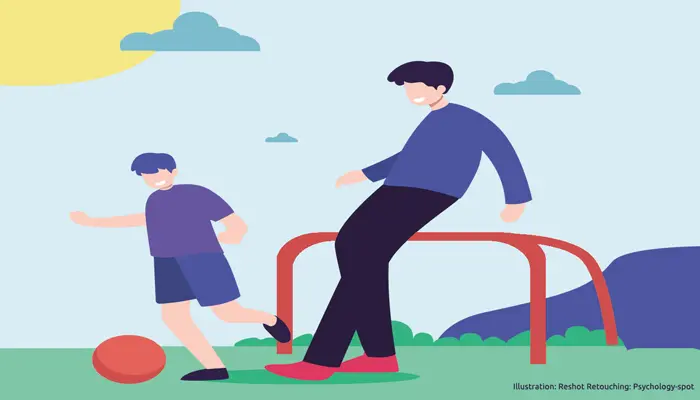
Being a parent is a full time “job”. There are no breaks or vacations. The dedication is total, 24 hours a day, 7 days a week. For this reason, some go so far as to affirm that taking care of their children is more stressful than working. However, although each family is different, the level of stress generated by parenting sometimes depends on the educational style assumed by each parent.
Raising a child always involves a certain amount of concern. It’s understandable. In fact, it is normal for parents to worry about the health and well-being of their children. It is also normal for them to worry about creating a safe environment where they can grow up safe and sound. And that they strive to provide them with opportunities for growth. However, sometimes the “normal” concern degenerates into almost pathological overtones and security transmutes into overprotection.
Intense parents, exhausted parents
In 2012, two psychologists at the University of Mary Washington wondered why most people think that having children will make them happier, but then parenting diminishes the well-being of some while others report feeling more satisfied with their lives. To try to understand this paradox, they interviewed 181 mothers whose children were less than 5 years old.
They focused on 5 key aspects that characterize intensive parenting:
1. Essentialism, the idea that mothers are more necessary and capable than fathers in raising children.
2. Parental fulfillment, the belief that the happiness and joy of parents derive primarily from their children.
3. Stimulation, the idea that mothers have an obligation to provide their children with the best activities to stimulate their intellectual development.
4. Defiant, the belief that raising a child is the most difficult and exhausting job in the world.
5. Child-focused, the idea that the needs and desires of children should always come before those of the parents.
The researchers found that “Intensive maternal beliefs are detrimental to mothers’ mental health,” regardless of the family support they receive. The higher the mothers scored on these aspects, the more intense their parenting style was.
Mothers who used to practice an overprotective education, thought that their children were sacred and that they should give themselves completely to them, experienced less satisfaction with their lives, were more prone to depression, and suffered from more stress and anxiety.
By delving into the underlying beliefs, the psychologists found that mothers who believed that their children were the most important thing in the world and put them before absolutely everything (even in situations where it was not necessary or was counterproductive), they were not only more stressed but also more dissatisfied with life. In contrast, those who thought parenting was hard work were more depressed.
Therefore, they concluded that the intensive and overprotective parenting style is not only harmful for the psychological development of children by limiting their potential and their abilities, but also for parents.
Intensive parenting is not the answer
Today, parents are under constant scrutiny. Never before has there been so much social pressure on fatherhood and motherhood. Parents, and especially mothers, receive a lot of advices and recommendations on how to educate their children.
A good mother is supposed to be emotionally available to her children. She must constantly stimulate them, taking them to museums and enrolling them in extracurricular activities. She must protect them and guarantee them the best. She must make sure they are happy and save them trouble. She must put them before everything and everyone…
However, many times all those “duties” end up leading to an intensive and overprotective parenting style that can make parents unhappy, adding completely unnecessary pressure.
Interestingly, researchers from Harvard University discovered that this intensive parenting style comes mainly from the United States, a country where parents want their children to be more intelligent and develop their intellectual potential to succeed in life.
Instead, Dutch parents preferred their children to focus on rest, cleanliness, and developing healthy routines. Italian fathers wanted their children to be even-tempered, balanced and likeable, and Indian mothers wanted their children to be responsible and hospitable.
Little by little, the dominant cultural model of parenting in the United States has been spreading throughout the world, placing additional pressure on fathers and mothers. Intensive parenting consists of being constantly attentive to children, anticipating their needs and desires, scheduling multiple extracurricular activities that allow them to develop cognitively.
This type of parenting not only demands a significant amount of time and energy, but also prioritizes quantity over quality. As a result, these parents end up trapped in a spiral of soccer practices, ballet classes, piano lessons, chess club… And they do it only because other parents are doing the same thing and they don’t want their children to start at a “disadvantage” in life.
Deep down, the concept of intensive parenting is more like a competition than education based on love and common sense. For that reason, if you want to really enjoy your child, it might be better to learn to flow a little.
We need to find that middle ground of moderation where, obviously, we should care for, protect and provide opportunities for our children, but without pursuing unattainable ideals that do no one any good – neither the children nor their parents. In fact, intensive parenting does not guarantee the success of children, much less the happiness of parents.
Sources:
Schiffrin, H. H. et. Al. (2012) Insight into the Parenthood Paradox: Mental Health Outcomes of Intensive Mothering. Journal of Child and Family Studies; 22(5): 614–620.
Harkness, S. et. Al. (2009) Parental ethnotheories of children’s learning. In: Developmental-Behavioral Pediatrics (Fourth Edition), Elsevier.




Leave a Reply